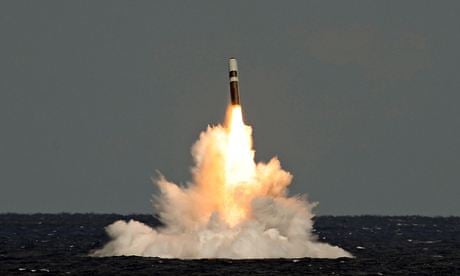Today, Tuesday, a number of MPs are questioning why Britain needs to renew its fleet of Trident submarines equipped with intercontinental ballistic missiles armed with nuclear warheads.
It is a very good question, and one the leaders of Britain's two main parties have wanted to avoid.
Tuesday's debate in the House of Commons was called by the Scottish and Welsh national parties (the SNP and Plaid Cymru) and the Green party, represented in the Commons by the MP for Brighton Pavilion, Caroline Lucas.
It was opened by the SNP leader in the Commons, Angus Robertson.
The large majority of Conservative MPs, and most Labour MPs it seems, want to renew the Trident fleet at an estimated cost of £100bn. Conservative ministers say Britain's nuclear weapons are a credible deterrent and "the ultimate guarantee" of the country's security.
I suspect that ministers and their defence chiefs cannot even contemplate running down, let alone abandoning, its nuclear missile arsenal. For a start, Washington would not be happy.
The Labour leadership wants to renew the Trident fleet, fearful perhaps of being branded irresponsible and naive, of threatening jobs, and of being weak on defence and security.
The government's own reluctance to avoid debating Trident's future was well illustrated by the way the Ministry of Defence slipped a written statement into the Commons on 18 December last year, the very day parliament began its Christmas recess.
The MoD announced that, with the Treasury's permission, it had earmarked a further £261m investment in a new Trident submarine fleet. It had done so, explained the MoD, to "save costs". Yet parliament will not vote on a decision to go ahead with a new Trident system until 2016.
More than £3bn has now already been allocated to a new Trident project, mainly for what the MoD calls "long lead items" - thereby allowing proponents of Trident to say that since so much has already been spent on it, it would be a waste of money to stop the project in 2016.
Kate Hudson, general secretary of CND (which is planning an anti-Trident demonstration in London on Saturday) has made the point that the government had no mandate to authorise the Trident expenditure ahead of the vote in 2016.
In the Commons on Tuesday, Michael Fallon, the UK defence secretary, fell back on a well-worn ministerial phrase saying he "did not recognise" the £100bn figure. Yet he added it was not possible to put a total figure on the cost of replacing Trident.
Cost is certainly an issue.
As the Liberal Democrat former defence minister, Sir Nick Harvey, has pointed out, the Royal United Services Institute thinktank , predicts that by the early 2020s the replacement of the nuclear deterrent – will account for some 35% of the defence equipment budget. Yet Trident's future will be excluded from the Strategic Defence and Security Review due after the general election later this year.
Apart from the cost, there is the more significant question of Trident's potential use - the credibility of nuclear weapons as a deterrent, and how independent from the US it really is.
In his memoirs A Journey, Tony Blair, said about Trident, "the expense is huge and the utility … non-existent in terms of military use". In the end he thought giving it up would be "too big a downgrading of our status as a nation".
The defence minister, Philip Dunne, told the Labour MP Paul Flynn, last year that "a number of reports have been identified that relate to the effects of the use of a UK nuclear weapon". He added: "This information is, however, being withheld to safeguard national security, because its release would prejudice the defence of the UK, and because it relates to the formulation of government policy."
It was "inconceivable", Harvey told the Commons on Tuesday, "any sane person could press the button".
A report by an all-party Trident Commission, set up by the British American Security Information Council, (BASIC) concluded last year that the life expectancy of the UK's nuclear capability, without US help, could be measured in months. Britain's deterrent is "a hostage to American goodwill", it said.
In their book, The Ultimate Weapon is no Weapon (Perseus Books, 2010), Shannon Beebe and Mary Kaldor refer to the now familiar argument – deployed in Tuesday's Commons debate - that deterrence does not work against rogue states and terrorists.
The authors add: "And if deterrence only works against states that are rational, why do we need nuclear weapons at all? Surely no rational state would threaten to use them".
The global, humanitarian, consequences of a nuclear attack, the cost of renewing the Trident fleet, its effectiveness as a deterrent, the role of Britain's 120 operational nuclear warheads in a world with 17,000 nuclear weapons, the claim that Britain's determination to keep nuclear weapons would send a dangerous message to the rest of the world – all these were seized on in a good Commons debate where the ghost of a possible significant increase in the number of SNP seats at the election (to the detriment of Labour) hovered above.
Trident's role when the main threat, according to the government, is extreme Islamist-based terrorism, needs to be debated again - before the general election, even though, judging from Tuesday's debate, Tory and Labour front benches are in no mood to budge.

Comments (…)
Sign in or create your Guardian account to join the discussion